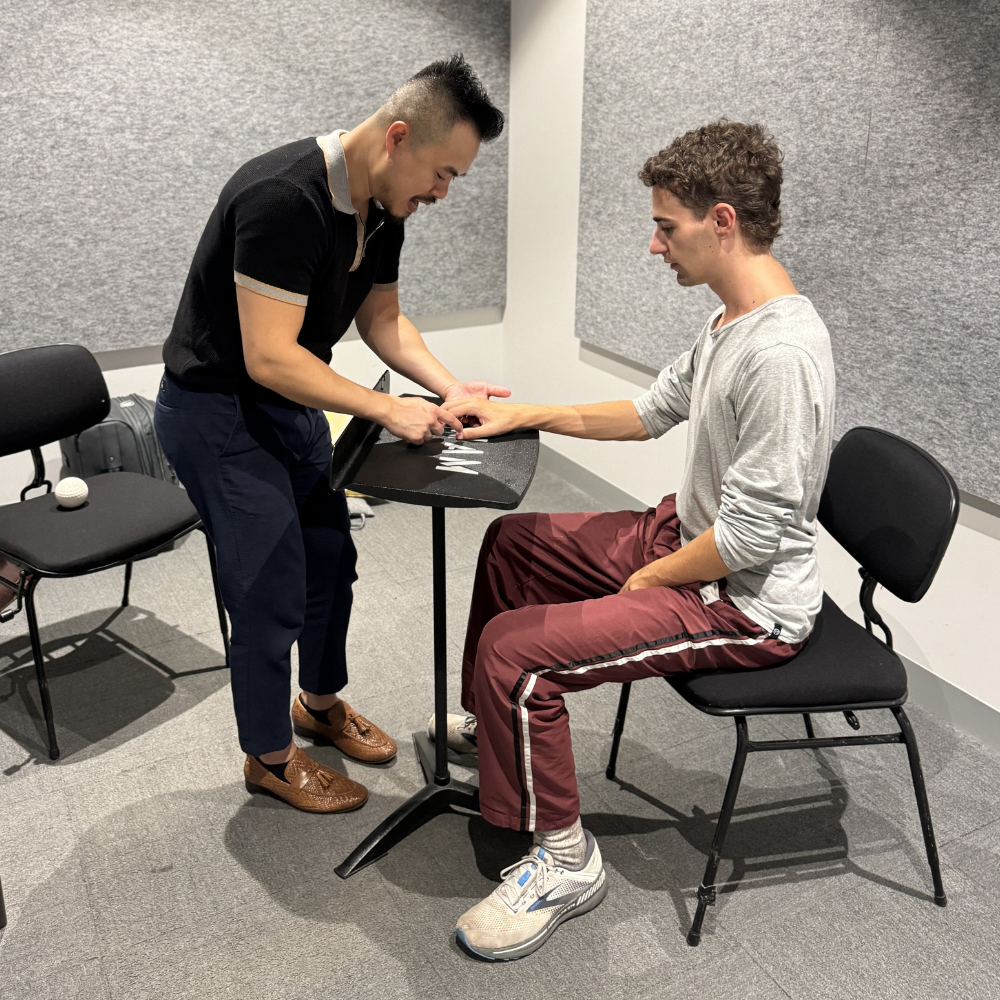Here at ANAM we are committed to prioritising the health and wellbeing of our musicians. Guided by seven core principles within the Healthy Conservatoires Wellbeing Network, ANAM understands the importance of a comprehensive approach to musician care. The 2013 Musical Impact Research Project underscored the urgent need for significant changes in training methods to safeguard musicians' health and wellbeing. This research led to the establishment of the Network, which assists institutions in staying current with innovative, evidence-based practices and offers peer support to foster healthy environments for artists.

Dr. Cliffton Chan working with ANAM Musician Ronan Apcar.
ANAMs people and Culture Manager, Charlotte Cassidy explains that “pain in elite music making isn’t abnormal, lacking the skills to manage it, is. Advice from consultant Dr Bronwen Ackermann about workload and understanding patterns of overuse (through things like rehearsal and performance scheduling) was profound: whilst we already had a highly developed sense of what consisted as ‘too much’, we then learned about how our program could support the idea of building up strength and stamina; and how we needed to plan ahead for busy periods.”
The Healthy Conservatoires Wellbeing Framework identifies eight key factors crucial to a musician’s wellbeing. With the support of donors, ANAM’s Health and Wellbeing Program addresses these factors as follows:
- Emotional wellbeing, with a focus on providing extensive psychoeducation resources and facilitating access to psychologists;
- Environmental wellbeing by connecting musicians with community engagement at local schools, promoting connection with the Abbotsford Convent community, use of outdoor spaces, and a focus on Indigenous stories and history of the site;
- Physical wellbeing is addressed by offering mind/body integration sessions and resources, such as physiotherapy and the Feldenkrais Method. ANAM musicians scheduling within the training programs are carefully timed to avoid burnout and injury;
- Musicians are supported in their financial wellbeing through the provision of financial assistance, access to hardship support, and an instrument repair fund. Musicians are offered subsidised psychology and physiotherapy services, as well as cheaper dental rates;
- The intellectual wellbeing of the ANAM musicians by hosting keynote speakers to provoke creative thought inside and outside of music, and encouraging cross-artform collaborations with ARTS8 partners;
- Social wellbeing is fostered through organising social activities among the ANAM cohort, and by engaging the musicians through the Syndicate Program, which offers individual musician support and the network of ANAM supporters and music lovers;
- Values and ethics are also at the heart of the training program, with ANAM mindful of the types of musicians ANAM wants to send out into the world. We encourage discussions and role-modelling our values and ethics through their training at ANAM.
Penny McDonald, a teacher of the Alexander Technique, shares her experience: "I have been honoured to bring the Alexander Technique to ANAM musicians for over 20 years. Employed by performing arts institutions around the world, this technique teaches musicians how to use their body and mind efficiently, helping to prevent pain and injury. The method promotes a positive approach to music making, also encouraging musicians to be kind to themselves when things are less than perfect; in doing so we also address the mental health of the artist. A healthy and happy musician creates beautiful music."
Dr Cliffton Chan, ANAM physiotherapist, emphasises the importance of early intervention: "My work with ANAM musicians is so important...this group is so high functioning and performing that when they do get a niggle [pain], it can escalate very quickly...if we can nip it in the bud, they can pursue long and healthy careers."
In Australia, it is estimated that around 74% of tertiary orchestral musicians experience physical problems from playing their instruments. Similar statistics in professional musicians in the UK relate to anxiety and depression. The ANAM health and wellbeing program means that musicians can avoid being part of these statistics.
Words by Evan Lawson.
First published in volume 52 of Music Makers.